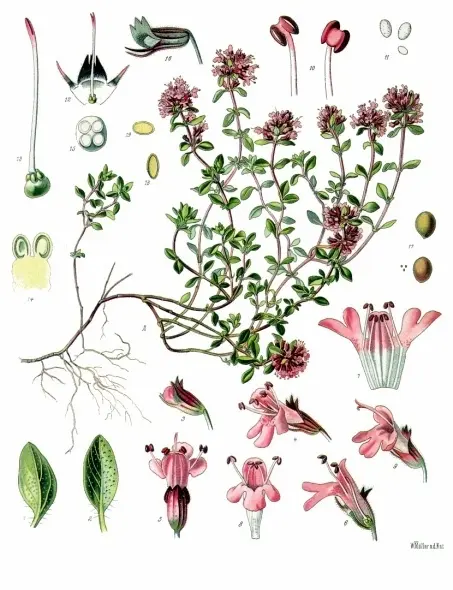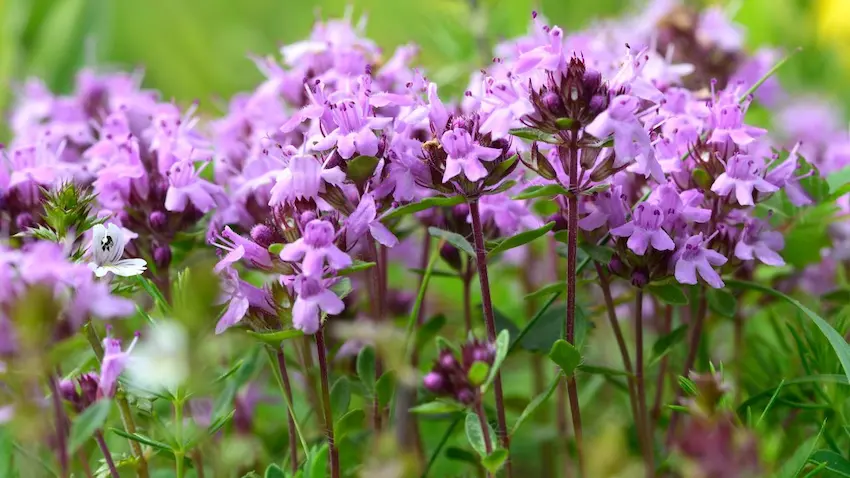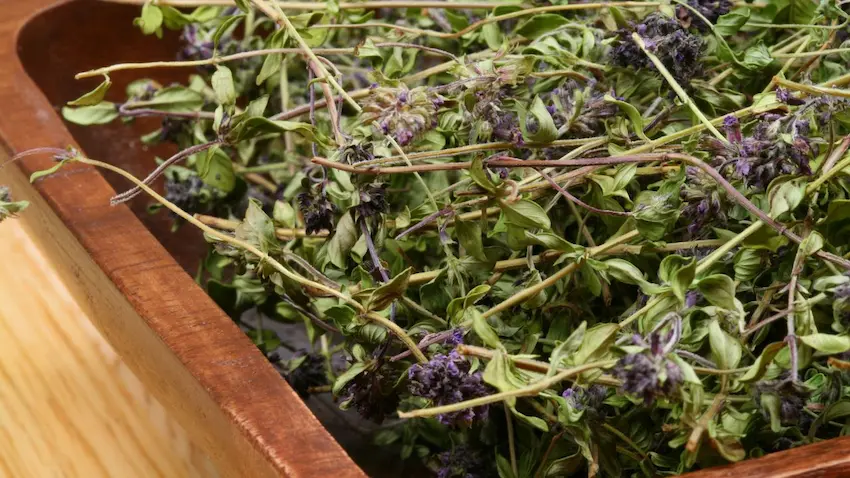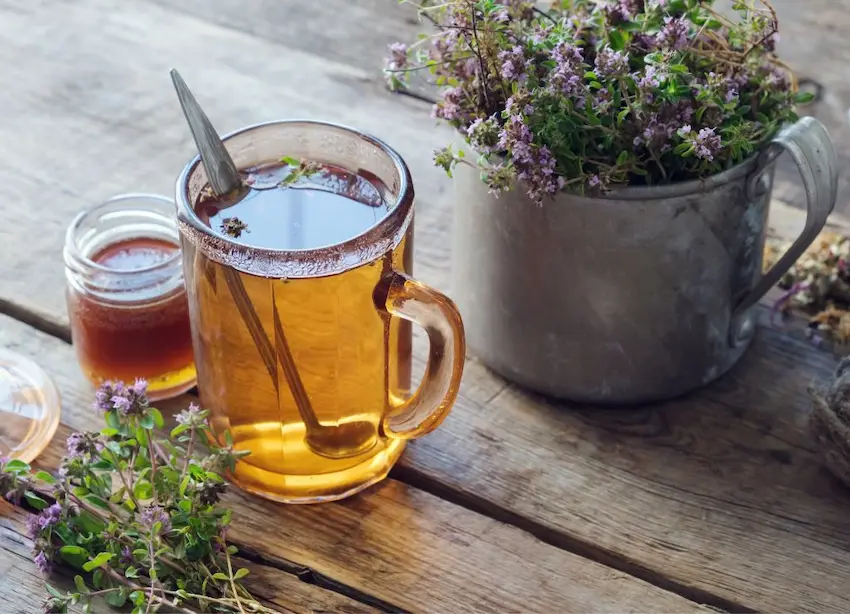Thyme, scientifically known as (Thymus serpyllum L.), holds several vernacular names including “elfin thyme” or “wild thyme” and it belongs to the perennial plants of the Lamiaceae family. This shrub-like plant, boasting a woody base, sprawls across the ground while sprouting upright, 20 cm tall shoots that exhibit a vibrant red hue when young. The leaves are petite and oval-shaped, tapering at the tip and attached by short petioles. The flowers, varying between crimson and sometimes blue, form spherical clusters at the tips of the stems, exuding a strong and pleasing aroma.
The meadow variety, Thymus serpyllum, otherwise known as thyme, thrives in dry grasslands, sun-drenched hillside locations, alongside ditches and roads, above caves, and near seashores.
Taxonomy
| Kingdom: | Plantae |
| Order: | Lamiales |
| Family: | Lamiaceae |
| Genus: | Thymus |
| Species: | Thymus serpyllum |
Other names: elfin thyme, wild thyme…
Blooming period
| I | II | III | IV | V | VI |
| VII | VIII | IX | X | XI | XII |
What does thyme contain?
Thymus is a rich repository of iron, calcium, essential oils, resin, tannin, bitter substances, saponosides, and phenolic compounds, such as thymol, carvacrol, cymene, linalool, and p-cymene. These constituents bestow upon the plant a potent antiseptic action. The plant’s essential oil content peaks around two hours after midday. This oil displays a deep red hue, an aromatic scent, and a pungent taste, and it carries the distinctive aroma of thymol.
When to harvest thyme?
As for the harvesting of thyme, it blooms from May to September. Collection of sprigs with blossoms occurs before and during the blooming stage. Only the top segments of the shoots are used, excluding the lower, woody portions. It is essential to use a knife for cutting rather than pulling, so as not to damage the wooden part from which the plant grows.
What is the thyme good for?
Prized for its healing versatility, thyme shines in natural medicine. As an antitussive, it appears often in syrups and potions. Treating bronchitis, pneumonia, and persistent coughs, it truly stands out. Moreover, it offers relief for asthma symptoms. Lastly, it softens bronchial mucus, making expectoration easier.
Thymus isn’t just for respiratory woes. It also eases gastrointestinal issues like bloating, abdominal pain, and chronic gastritis. Furthermore, it helps regulate menstrual irregularities and strengthens the heart. Importantly, it aids anemics in blood formation. For neurasthenia, stomach disorders, and joint pain, the thymus proves useful. Lastly, with honey and lemon, it transforms into a delightful tea substitute.
Thyme as a Remedy – Preparation, Application, and Effects
Application of the Plant Against Intestinal Parasites
When intestinal parasites appear in stool, thymol offers a solution. Depending on age, mix 2-8 grams of it with fruit juice, then follow with two large spoons of castor oil. Alternatively, steep 20 grams of thyme in 250 ml of boiling water. Sweeten with a large spoon of honey and consume a small cup daily for 4-6 weeks.
Preparations for Various Health Issues
Thyme, a known remedy for ailments like coughs, bronchitis, and insomnia, among others, can be prepared simply. Steep a large tablespoon of thymus in boiling water, then add honey and lemon juice after 15 minutes. Sip this soothing mixture throughout the day.
For severe coughs, increase the thymus to three large tablespoons per half liter of boiling water. After a two-hour steep, strain and sweeten with honey. Take one large tablespoon hourly. Similar preparations can be made with a blend of thyme and chestnut leaves, or thyme, chestnut, and sundew. The common practice is to steep the whole plant and consume 4-6 cups daily.
Thyme in Combination with Other Herbs
In treating coughs with bleeding and alleviating asthma. Thyme cooked in wine with equal amounts of polypody root and fennel proves beneficial. This mixture is recommended for morning consumption, on an empty stomach.
A comforting chest tea brews by immersing three generous spoonfuls of a finely chopped blend into half a liter of boiling water. This mixture contains equal parts of mallow flower (Malva sylvestris), wild poppy (Papaver rhoeas), and mullein (Verbascum thapsus), each weighing 2 grams. Moreover, it includes 4 grams of anise (Fructus anisi), 15 grams of marshmallow root (Radix althaea), 20 grams of thymus leaves, 25 grams of licorice root (Radix glycyrrhizae), and 30 grams of marshmallow leaves (Folia althaeae).
After the covered blend steeps for two hours, it’s strained. Then, sweetening the concoction involves the addition of two generous spoonfuls of honey. A sizable spoonful of this therapeutic blend is ingested every two hours.
Treatment of Respiratory Diseases
To address bronchitis, pneumonia, and lung abscesses, steep a tablespoon of a blend containing 15 grams each of thyme, primrose root, and coltsfoot leaves in 250 ml of boiling water. Allow this to stand covered for 15 minutes before straining and sweetening with a teaspoon of honey. Sip the warm blend, consuming 3-4 cups daily. This tea serves to soften bronchial mucus, thus facilitating expectoration.
Using the Herb for Stomach Problems and Menstruation
To alleviate bloating and abdominal pain resulting from flatulence or menstrual irregularity. Steep three tablespoons of a blend containing 20 grams each of thymus, peppermint, chamomile, and yarrow in half a liter of boiling water. After allowing it to stand covered for three hours, strain the mixture. Consume the warm blend hourly, taking one tablespoon at a time.
You can also replicate this process using an equal 30-gram mixture of thyme, yarrow, and chamomile, enriched with 10 grams of licorice root. This tea combats chronic gastric catarrh, fortifies the heart, and contributes to blood formation, thus it is particularly beneficial for those dealing with anemia.
Thyme for Neurasthenia and Joint Pain
To alleviate neurasthenia, stomach disorders, and joint pains, steeping 4-6 grams of thyme in boiling water, coupled with honey and lemon juice, is advisable. Three times a day, one should enjoy a cup of this healing blend.
Thyme Tea for Relaxation
Thyme tea is an excellent natural remedy for relaxation and calming during stressful periods. Its soothing properties help combat nervousness, anxiety, and neurasthenia, and promote good sleep in individuals with insomnia. The preparation of the tea is simple: pour 250 ml of boiling water over one large tablespoon of dried thymus and leave it covered for 15 minutes. Then strain it, and add a teaspoon of honey and lemon juice if desired. Consume a cup of this soothing tea three times a day or immediately before bedtime to experience the beneficial properties of this herb on your body and mind.
Frequently asked questions from other readers
- Are there side effects to thyme tea?
Thyme, as a whole, is generally deemed safe for consumption. However, akin to any natural remedy, potential side effects may surface if consumed in excess, encompassing digestive discomfort, nausea, and even dizziness. Always wisely seek professional medical advice before using thyme as a therapeutic option, especially when concurrently taking other medications. - Is thyme safe for children and infants?
While thyme may be safe for older children in modest amounts, it is not recommended for infants. As with any natural remedy, it is crucial to consult a pediatrician prior to introducing thyme into a child’s diet. - How can thymus aid in calming?
Thyme tea harbors compounds that exert a soothing influence on both the body and mind. This tea can assist in the reduction of stress and anxiety, enhance sleep quality, and foster overall relaxation. Commonly, one should drink it before slumber or during the day when seeking tranquility. - How can thyme help with stomach issues?
Thyme possesses the capacity to alleviate a variety of gastrointestinal ailments, including bloating, abdominal pain, and chronic stomach inflammation. Its compounds can aid in the reduction of inflammation and calming the digestive tract, which could lead to an improvement in symptoms. - How can thyme tea benefit women?
Thyme tea can offer a multitude of health benefits for women. It can assist in easing the symptoms of PMS, regulating menstruation, and some research suggests it might also help with menopausal symptoms. Additionally, due to its calming effect, thyme tea can be particularly beneficial for women struggling with stress and insomnia. As always, it is necessary to consult with a doctor before utilizing thyme as a form of therapy.




